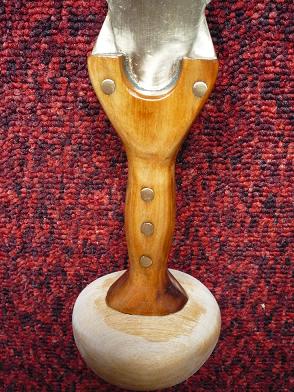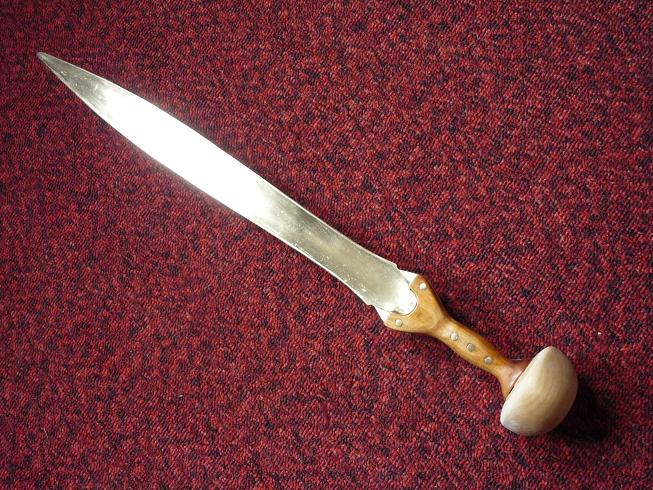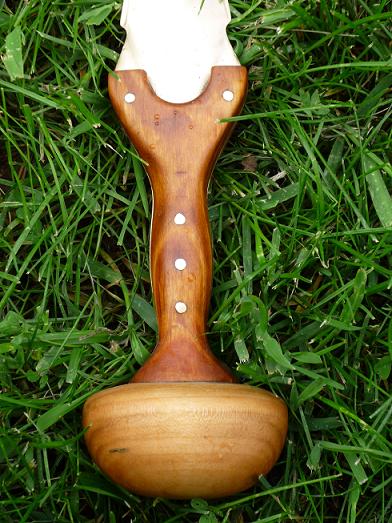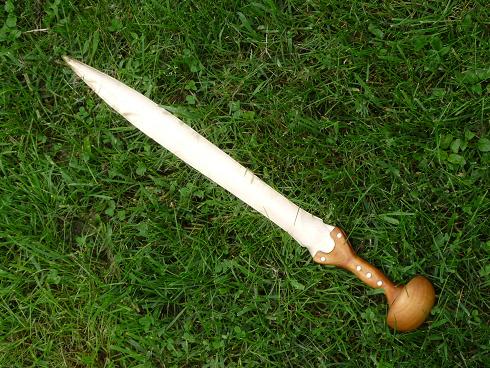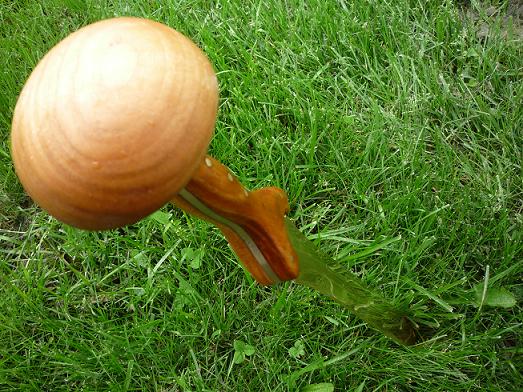Posts: 740 Location: Netherlands
Mon 16 May, 2011 2:42 pm
| Luke Zechman wrote: |
Matthew,
Thanks for the reply. So on one hand most of the thought I get form this forum suggest that we don't know exactly what these swords looked like. |
The handle shape of the Ewart Park sword is pretty well known. There are about 10 or so with bronze versions of the hilts, one with a wooden pommel and one with just the hilt plates in horn (but with extensions onto which a pommel would have been attached). Here are a few of those examples: http://1501bc.com/files/hilted_ewart_park_swords4.jpg
Unlike the continental swords, these seem to be shapes more suited for organic materials. In continental swords, there is often a clear difference between bronze hilted and organic hilted swords, so the bronze hilt shapes there don't translate well to organic materials.
| Quote: |
| Is my pommel completely removed from something that is possible? |
Considering the pommel shape is fairly uniform in shape amongst the found Ewart Park swords (one clear deviation: a penannular shaped pommel), it's pretty safe to say that the mushroom was the prefered pommel shape. But pretty much all pommels that I can think of have a clear step between the grip and lower end of the pommel, to provide a sturdy support against the back of the hand.
| Quote: |
| How do we know that they were not worried about balance? Why wouldn't they be? The way that I understand is that they were making swords of a quality far beyond what anyone else (reproductions) has achieved. If they were so good at crafting these blades, than why would they have not considered balance? |
As Matthew mentioned, pommels weren't used for balancing swords until very late, in the late medieval period. And even then most pommels are actually still hollow to make them as light as possible.
| Quote: |
| The reason not "one of everything" is a matter of money for me. I don't have the money to have "one of everything". I don't have the money to have several dozen custom pieces. I don't get a new sword every month. I don't get a new sword every couple of months. I will be getting another Burridge blade in the near future, and wanted some ideas. I like the khopesh, and also considered a Mycenaean Horned variety. I was just interested in what other people like. |
The most favorite on my wall is still the Mindelheim. It's one of those swords that you don't like that much at first, but which you will grow to like. It's so impressive when you see it in person.
| Quote: |
| I like a lot, so deciding is torture. If money was not an option, I wouldn't even be talking Bronze Age sword, I would be attempting to make a historically accurate falcata, or falx. |
In terms of making, money is not really a limitation, time is :)
Posts: 278 Location: Lock Haven Pennsylvania
Tue 17 May, 2011 7:51 am
After very little deliberation, I decided to make a new pommel for the Ewart Park. I know, I know... I want it to at least be historically plausible. I did like my original design, but I am not really interested in making fantasy swords. I have come this far on this project, and want it to be right. Either way I something good has come out of this. I have always wondered about the sturdiness of these pommels. Destroying this one off was easy, but it would have been hard to work it free from use.
I will post pictures later.
I am pretty certain that my next Bronze Blade will be a Mycenaean Type G Horned Sword.
Cheers
Posts: 278 Location: Lock Haven Pennsylvania
Thu 19 May, 2011 11:11 am
Posts: 438 Location: Canada
Thu 19 May, 2011 5:53 pm
It's a beauty, Luke. I like this one much better. You've done a great job.
Posts: 278 Location: Lock Haven Pennsylvania
Thu 19 May, 2011 8:51 pm
Thanks David!
I may take a bit of the high dome out of the butt of it yet. Make it a little flatter. I still need to soak it, but don't want to until it is finished (the linseed clogs up the file). Than sand it smooth, soak in oil, and after good finish is achieved I will slather it with bees wax. Put a final polish to the blade, and it will officially be done and done.
Posts: 1,457 Location: Laurel, MD, USA
Fri 20 May, 2011 6:56 am
Oh, lovely, I like that one! Good shape. It's a shade large overall for *my* taste, but I think Jeroen has done a couple about that size.
Nice work!
Matthew
Posts: 1,086 Location: Austin TX
Fri 20 May, 2011 7:09 am
Hi Luke,
Great work. You've put together some very handsome swords to say the least so congratulations for that (the gen2, the albion Mainz and now this, a very attractive lineup).
I am no specialist of this era by a longshot, but the pommel feels a bit oversized to me when looking at it on the pict showing the complete sword (Just like viking hilts might get in the way of your wrist when doing a slashing motion, but viking pommels were oten relatively flat, allowing for the "handshake grip", while it would not seem practical on yours that is round in section)?
Again, I know very little about these sword types, and your woodwork is outstanding in any case :)
J
Posts: 278 Location: Lock Haven Pennsylvania
Fri 20 May, 2011 7:36 am
Thanks Matthew and Julien!
The cross section is round, and I agree with the statement about the pommel. I am flattening the dome of the pommel right now. I also do not know enough about these sword. Jeroen had posted a link a few posts back showing some drawings of originals. I had always been a bit confused by this pommel shape as well, which is why I tried something a little different before.
Thanks concerning the line up. I would eventually like to have a decent collection of swords raging from Bronze Age to Roman. I would eventually like to have a top notch example of many swords within this large time frame. I was a falx, falcata, kopis, xiphos, more bronze swords and gladii. I am sure as time goes on I will become more versed in these more "ancient" types.
Cheers
Posts: 1,757 Location: Storvreta, Sweden
Fri 20 May, 2011 9:11 am
I like the shape of the pommel!
I would have made it smaller, however. Perhaps half size or one third smaller?
Posts: 278 Location: Lock Haven Pennsylvania
Fri 20 May, 2011 12:12 pm
Posts: 605
Mon 23 May, 2011 7:40 am
Yes, I like that pommel much better. It looks very much like the large one shown on the link above. I agree with Matthew in that if the sword feels a bit too point-heavy, you can grind a bit of weight off of the distal end of the blade. Even a very subtle change out there can have a drastic effect on the swords feel. I am working on my own bronze-age pommel (elk antler) and am having a hard time getting used to the idea of such wide flat pommels. Mine is about 6cm wide and 2cm thick. What are the measurements on yours?
Posts: 278 Location: Lock Haven Pennsylvania
Mon 23 May, 2011 8:47 am
Thanks Scott. I would love to see your sword when it is done. Since this thread is called Bronze Age Swords, perhaps you would be willing to post it here.
I am including stats for the Ewart Park here. They may change slightly since I will be doing some small finishing work. I do not have a scale, so weight will not be included, although I suspect around 2 pounds.
Overall Length: 24.75 in
Blade Length: 18.5 in
Grip Length: 4.75 in
Pommel 2 in thick, 3 in wide, Circular.
POB: 4 in from hilt interface.
Blade Max Width: 1.8 in
Posts: 605
Sun 19 Jun, 2011 12:33 pm
The sword I am working on is an iron Naue II, so I'll probably post it on a seperate thread as I start to make some progress. I would really like to see you do a cutting video. My suggestion for cutting material- meat please!
Posts: 278 Location: Lock Haven Pennsylvania
Sun 19 Jun, 2011 1:43 pm
Very nice. I would like to see that iron sword when it is done. I have done some cutting with this sword. I goes through milk jugs with ease. I got a little cocky the one day and tried a Gatorade bottle. It didn't cut the bottle at all, but it did crack the thing wide open. I have also used it to chop a 3in maple branch in two, and it did so without losing much of the edge. I am not familiar with posting videos. I could probably email you a video.
Posts: 3,638 Location: Maitland, NSW, Australia
Sun 19 Jun, 2011 3:06 pm
Barry Molloy has done plenty of cutting against various targets with bronze age swords and published the results. Here are some to start with.
Molloy, B., "For Gods or men? A reappraisal of the function of European Bronze Age
shields",
Antiquity, Vol. 83, (2009)
Molloy, B., "Swords and Swordsmanship in the Aegean Bronze Age,"
American Journal of Archaeology, Vol. 114, No. 3, (2010)
Molloy, B., et. al.,
The Cutting Edge: Studies in Ancient and Medieval Combat (Stroud: Tempus, 2007)
Posts: 605
Wed 22 Jun, 2011 1:42 pm
Dan, very interesting, I will have to see about finding those.
Luke, I started my first iron Naue II a couple of days ago and am about half done already. The flanges were surprisingly easy to do. I will be posting pics soon on the " Iron Naue II swords" thread. If you ever cut some meat or other interesting targets I would love to have you send me a video, but there isn't much to learn by cutting plastic bottles, though it is fun! Cutting a 3" maple branch is quite impressive though, I wouldn't mind seeing that.
Posts: 46 Location: Borås Sweden
Fri 12 Aug, 2011 1:38 pm
I have read this thread closely and also some other threads about Bronze swords and is starting to get interested in buying a sword from Neil and hilt it myself.
One thing that puzzles me is the wooden pommel attached to these swords.
With the exception of the Mindelheim sword with its hat-pommel, I have not seen any the wood pommels or bronze pommels attached to bronze swords.
When the swords are hilted with bronze hilts, they rather just have a horn-shaped flaring at the top of the grip.
Is there any good documentation somewhere (on the net) how these types of mushroom-shaped pommels looked.
I am mainly thinking of buying a Ewart Park or Limehouse sword.
Posts: 740 Location: Netherlands
Fri 12 Aug, 2011 2:07 pm
| Stephan Johansson wrote: |
I have read this thread closely and also some other threads about Bronze swords and is starting to get interested in buying a sword from Neil and hilt it myself.
One thing that puzzles me is the wooden pommel attached to these swords.
With the exception of the Mindelheim sword with its hat-pommel, I have not seen any the wood pommels or bronze pommels attached to bronze swords.
When the swords are hilted with bronze hilts, they rather just have a horn-shaped flaring at the top of the grip.
Is there any good documentation somewhere (on the net) how these types of mushroom-shaped pommels looked.
I am mainly thinking of buying a Ewart Park or Limehouse sword. |
If you scroll up to the top post by me you can find examples :)
Posts: 46 Location: Borås Sweden
Fri 12 Aug, 2011 2:56 pm
Thank you very much!
I must be very tired or something.
It would be interesting to see pictures of these swords, showing how the pommels were integrated with the side plates.
If one looks at the schetches it seems like the pommel and side plates were softly merging in to each other.
Do you know if there are any good pictures of these swords :)
Posts: 820 Location: Texas
Sat 13 Aug, 2011 9:38 pm
| Stephan Johansson wrote: |
Thank you very much!
I must be very tired or something.
It would be interesting to see pictures of these swords, showing how the pommels were integrated with the side plates.
If one looks at the schetches it seems like the pommel and side plates were softly merging in to each other.
Do you know if there are any good pictures of these swords :) |
Hi Stephan,
I believe you said that you know about how the Hallstatt sword pommels were attached. This included a range of methods such as pins, pegs, rivets, hooks, spikes with and without rivet blocks. It is obvious that they were experimenting with different techniques of how to keep the pommel on the grip. J. D. Cowen said that these strategies were distributed geographically rather than chronologically. So it was not necessarily a trial and error thing as it was that every different region had it own strategy. If you haven't seen the Hallstatt C thread it talks about some of these.
http://www.myArmoury.com/talk/viewtopic.php?t=3475
However, I believe your question is how did the pommels attach to the grip plate extensions before they began to use these strategies to attach them to the grip tang itself. Well I only know of one picture of a pre-Hallstatt grip tongue sword with the organic grip and pommel still attached that shows one such strategy. As best I can tell from the picture, it shows two methods. One is that there may be a short extension of the grip plates up into the base of the pommel and then a wooden peg is drilled all the way through the pommel and grip plate extension to "nail" it together. They also had mastic to glue it on also. If you look at the image you can see what looks like a peg at the bottom of the pommel. The second method is to have the grip plates extend all the way through the pommel, to be exposed at the top. And then a hole is drilled in the center and a peg is hammered into this hole causing the tow sides of the grip plate extensions to press outward to hold the pommel tightly to the grip extensions by pressure and frictional force (like on a wooden hammer handle when they drive a wedge in the wood at the top.
Hope this helps a little.
take care
(Luke... Great Work!)
ks
 Attachment: 97.11 KB
Attachment: 97.11 KB
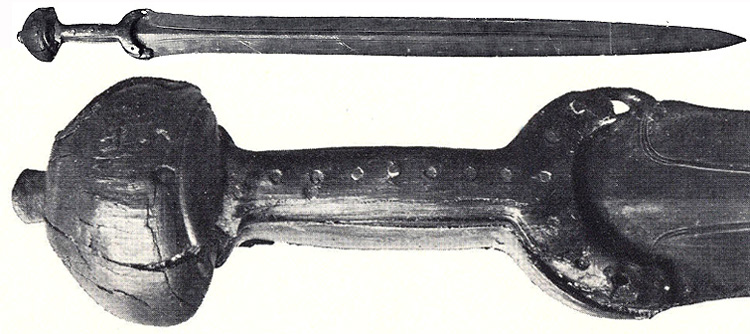
Wood Hilt with Peg Attachment from Viborg Denmark. Image from "Vorgeschichte der deutschen Stämme" by Prof. Dr. Hans Reinert
You
cannot post new topics in this forum
You
cannot reply to topics in this forum
You
cannot edit your posts in this forum
You
cannot delete your posts in this forum
You
cannot vote in polls in this forum
You
cannot attach files in this forum
You
can download files in this forum
